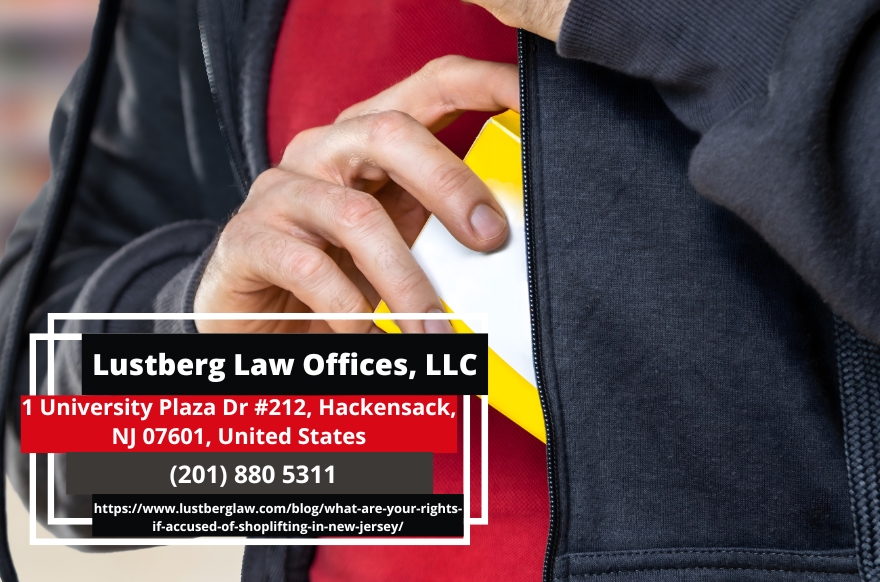New Jersey Shoplifting Lawyer Adam M. Lustberg Explains Legal Rights and Penalties for Shoplifting Accusations
Being accused of shoplifting in New Jersey is a situation that can have far-reaching legal and personal consequences. New Jersey shoplifting lawyer Adam M. Lustberg (https://www.lustberglaw.com/blog/what-are-your-rights-if-accused-of-shoplifting-in-new-jersey/) of Lustberg Law Offices, LLC offers crucial insights into the legal process, potential penalties, and the rights of individuals facing such charges. As a theft crime, shoplifting is treated with seriousness in the state, and a conviction can result in jail time, financial penalties, and long-term impacts on a person’s criminal record and reputation.
Facing a shoplifting accusation requires a clear understanding of one’s legal rights, and according to New Jersey shoplifting lawyer Adam M. Lustberg, those rights include the right to remain silent, the right to legal representation, and the presumption of innocence until proven guilty. These protections can play a vital role in the outcome of a case and should guide a person’s decisions following an accusation.
The legal penalties associated with shoplifting in New Jersey vary based on the value of the allegedly stolen property. New Jersey shoplifting lawyer Adam M. Lustberg explains that charges can range from a disorderly persons offense to an indictable crime. “Even a disorderly persons offense, although the minimum level of shoplifting offense, can still have a great impact on your record,” he emphasizes. A person convicted of shoplifting may face jail or prison time, probation, license suspension, community service, and other consequences, depending on the severity of the offense.
Shoplifting offenses are divided into categories. A disorderly persons offense involves stolen property valued at $200 or less and can result in up to six months in county jail. A fourth-degree indictable offense, involving property valued between $200 and $500, can lead to up to 18 months in prison. Third-degree offenses, concerning property valued between $500 and $75,000, carry prison sentences of 3 to 5 years. The most severe, second-degree offenses—reserved for property over $75,000—can result in 5 to 10 years of incarceration. These legal distinctions play a critical role in determining the path of each case.
Adam M. Lustberg also highlights the impact a shoplifting conviction can have beyond the courtroom. Shoplifting is considered a “crime of moral turpitude,” which means that even a lower-level conviction can carry immigration consequences, including possible deportation for non-citizens. It can also prevent individuals from pursuing certain professional opportunities or public office.
For first-time offenders, New Jersey law provides alternatives to traditional sentencing. Adam M. Lustberg notes that programs such as Pretrial Intervention (PTI) and Conditional Dismissal offer individuals a path that avoids a criminal record. PTI allows eligible first-time offenders to avoid trial through supervised probation, while Conditional Dismissal provides similar benefits for disorderly persons charges. Community service and restitution may also be available in some cases. These programs are designed to offer a second chance while still ensuring accountability.
The process of being charged can also be complex. It may take weeks or even months to receive a summons after an incident, depending on how swiftly the police and courts process the paperwork. Adam M. Lustberg explains that the statute of limitations varies based on the value of the stolen items. For disorderly persons offenses, legal action must begin within one year. For indictable offenses, the time limit extends to five years.
Another key factor for those accused is understanding how long the charge will stay on their record. Shoplifting convictions may be eligible for expungement after five to six years, depending on the offense. Adam M. Lustberg points out that New Jersey offers “early pathway” expungement options for individuals who maintain a clean record and meet specific criteria, potentially shortening the waiting period.
In stressful moments, such as being accused of shoplifting, individuals may inadvertently hurt their own case. Adam M. Lustberg advises people not to sign documents, make statements to store staff, or attempt to flee the scene. “Any statement may be used against you,” he notes, urging individuals to remain calm, avoid confrontations, and wait to speak with their attorney.
The potential for a civil lawsuit from a store owner also exists, even if criminal charges are not immediately filed. As a result, seeking legal help promptly is essential. Adam M. Lustberg and the team at Lustberg Law Offices, LLC assist clients through every stage of the legal process, advocating for the most favorable outcome based on the facts of the case.
Anyone facing shoplifting charges should act quickly to secure legal guidance. Working with Lustberg Law Offices, LLC, Adam M. Lustberg provides strategic defense services aimed at protecting clients’ rights and reducing the impact of criminal allegations.
About Lustberg Law Offices, LLC:
Lustberg Law Offices, LLC is a criminal defense law firm based in New Jersey. Led by attorney Adam M. Lustberg, the firm represents clients in a wide range of criminal matters, including theft and shoplifting charges. The firm is committed to helping clients navigate the legal system and fight for fair and just outcomes in their cases.
Embeds:
Youtube Video: https://www.youtube.com/watch?v=GXzGPKw8t-c
GMB: https://www.google.com/maps?cid=17248268094099978177
Email and website
Email: [email protected]
Website: https://www.lustberglaw.com/
Media Contact
Company Name: Lustberg Law Offices, LLC
Contact Person: Adam M. Lustberg
Email: Send Email
Phone: (201) 880-5311
Address:One University Plaza Dr Suite 212
City: Hackensack
State: New Jersey 07601
Country: United States
Website: https://www.lustberglaw.com/



